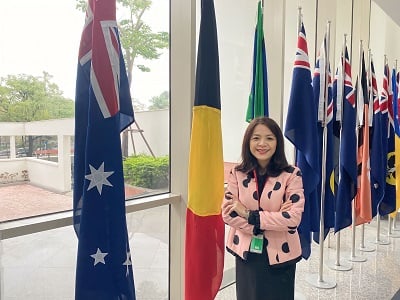 |
Dang Thi HanhCountry Manager, ASEAN-Australia Counter Trafficking program (ASEAN-ACT)
“I cannot imagine the life of vulnerable people, women and children caught in horrible circumstances with their dignity disregarded … That truly brings tears to my eyes and motivates me to design and deliver the programs to be as effective and practical as possible.”
|
Speaking about the 50th anniversary of diplomatic relations between Vietnam and Australia, Dang Thi Hanh believes that such ties over an extended period of time is not something every country possesses. Regarding the issue of human trafficking, Hanh has high regard for the Australian Government’s long-term commitment to supporting Vietnamese agencies with a focus on capacity building, saying, “For Vietnam, this support is extremely valuable.”
As of 2023, Australia has supported the criminal justice systems in ASEAN countries for 20 years to effectively address the issue of human trafficking (and in collaboration with Vietnam since 2008). In particular, the ASEAN-Australia Counter Trafficking program (ASEAN-ACT), running for 10 years from 2018 to 2028, has already seen positive impacts in the ASEAN region and in Vietnam, in particular.
Of the ASEAN-ACT program so far, Hanh says: “I’m proud that we have contributed to build a team of core capable and experienced trainers who are able to design and deliver learner-centred and participatory capacity building activities on counter trafficking in persons, using internationally advanced methods. The program has enhanced a good understanding of Vietnam's policy frameworks and international context, improved skills and attitudes by officers which means an improved capacity to address [human trafficking] cases, better support and protection of victims. Perhaps the most important thing is the contribution to policy advocacy. ASEAN-ACT supported Vietnamese agencies to develop the 5-year Vietnam Plan of Action to Counter Trafficking in Persons , 2021-2025 with a vision to 2030.
“Right now, we are providing technical assistance to different agencies to propose changes to the draft amendment of the Law on Human Trafficking Prevention to make it more practical, provide a better legal platform for victim support and protection, support more effective handling of trafficking in persons cases and more compliance to international commitments where Vietnam has ratified.”
In addition to improving capacity for criminal justice agencies in the country, ASEAN-ACT also supports Vietnam partners to establish effective cooperation channels with other ASEAN countries on this issue. As many victims from Vietnam are trafficked to other ASEAN countries, and Vietnam itself is a transit point to move victims across borders, Vietnam’s engagement has contributed to addressing problems related to human trafficking in the region. Progress will be faster and more effective when all parties involved have better understanding and are in contact with related stakeholders.
Hanh has adopted different approaches to problems, such as: how to identify the exact problem to solve when the understanding on human trafficking is different; how to design and provide suitable capacity building program when there are different levels of knowledge and experience among officers, and who have a heavy workload undertaking multiple roles at the same time; how to select priorities with a modest budget; how to operate projects on schedule during the COVID-19 pandemic; and how to align different regulations of various agencies participating in the projects.
Talking about her motivation, Hanh movingly said: “For me, I think working in counter trafficking in persons is humanitarian work that provides support to disadvantaged and vulnerable people and helps victims reclaim their normal life. Many of them encounter extreme difficulties to return to the everyday life they once had, and to forget traumatised experiences and what they have been through. And through each activity, I can see the changes in officers’ attitudes and actions towards victims and when they talk about the victims. When they can provide better support for the victims and help prevent human trafficking, then that is the success of the program.”
